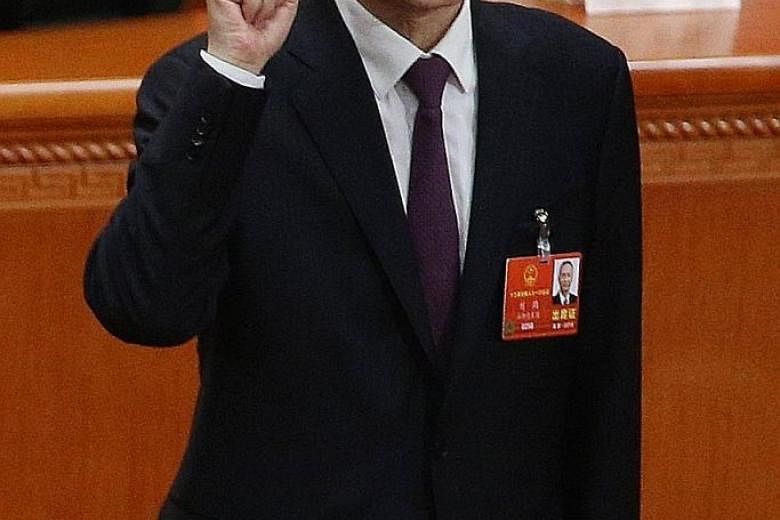President Xi Jinping's top economic adviser Liu He was made, as widely expected, one of China's four vice-premiers, showing Beijing's determination to deepen reforms to stem financial risks.
Harvard-educated Mr Liu, 66, is known to be the architect of China's financial and economic reforms, driving supply-side policies such as cutting overcapacity in steel and coal as well as excess housing stock.
Analysts say his elevation yesterday to vice-premier overseeing the economy and finance sector will ensure a steady roll-out and implementation of the reform plans.
China has said that fighting financial risks - such as reducing debt, preventing housing bubbles and stamping out shadow banking - will be one of its top priorities in the next three years.
"The top leadership has set clear goals and plans for China's new stage of development. The key is to find the right people to implement them and Liu He is the right person," said Renmin University finance professor Zhao Xijun.
"He is extremely familiar with the problems that the economy faces, such as the need to upgrade industries at the macro level as well as the need to improve the efficiency and output of individual firms at the micro level."
Mr Liu was elected into the 25-member Politburo - the second-highest rung of China's political power structure - at the 19th National Congress of the Chinese Communist Party (CCP) last October.
Since 2013, he had been heading the General Office of the Central Leading Group for Financial and Economic Affairs and serving as a deputy head of the National Development and Reform Commission (NDRC), China's top economic planning agency.
Another signal of policy continuity was the promotion of long-serving deputy central banker Yi Gang to head of the People's Bank of China (PBOC).
The 60-year-old is a United States-trained economist who has been with the PBOC for 21 years. Given that he spent the past 10 years as a close deputy to his predecessor Zhou Xiaochuan, analysts expect him to continue to push for reforms, including opening China's capital markets and liberalising the exchange rate regime.
"As a technocrat, Yi Gang commands considerable expertise, providing a steady hand at the top of China's central bank, which now has extended powers over macro-prudential policies as well," said HSBC co-head of Asian economics research Frederic Neumann.
China merged the banking and insurance regulatory bodies in a recent sweeping government reorganisation, transferring more powers to the central bank in an effort to curb financial irregularities such as regulatory arbitrage.
But some analysts noted that Mr Yi may not command the same clout as Mr Zhou.
"Frankly speaking, (Mr Yi's promotion was) a bit unexpected as he holds a relatively low political ranking as an alternate member of the CCP's Central Committee," said OCBC Bank economist Tommy Xie, referring to the top decision-making body comprising 204 full members and about 170 alternate members.
Yesterday, Mr Liu Kun, a former vice-finance minister, was elected to replace Finance Minister Xiao Jie, while Commerce Minister Zhong Shan and NDRC head He Lifeng were both re-elected.

